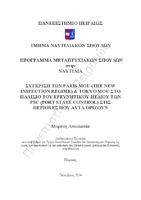Σύγκριση των Paris MOU (The new inspection regime) & Tokyo MOU στο πλαίσιο του ερευνητικού πεδίου των PSC (Port State Control) στις περιοχές που αυτά ορίζουν

View/
Subject
Λιμάνια -- Κανονισμοί ασφαλείας ; Πλοία -- Κανονισμοί ασφαλείας ; Πλοία -- Επιθεώρηση ; Harbors -- Safety regulations ; Ships -- Safety regulations ; Ships -- InspectionAbstract
Shipping is a very dynamic sector of global industry, with the Port State Controls being a valuable method for the assessment of ships in monitoring the successful implementation of the provisions of the various international conventions covering safety, working conditions and the prevention of pollution in commercial ships. Also, they are a very important tool for monitoring the effectiveness of the inspections carried out. Following the developments in the two very important Memorandum of Understandings - the Paris MOU and Tokyo MOU in terms of Port State Controls, this study presents and examines the New Inspection Regime - NIR of the Paris MOU, which is then compared with the corresponding inspection regime of Tokyo MOU. The comparison of the two MOUs is done through statistical and qualitative analysis based on requirements and market trends/developments for the years 2011-2013, as the NIR of Paris MOU was launched in 2011. The study begins with definitions and basic concepts of Port State Controls and the areas they cover. Subsequently, the two MOUs are presented separately for detailed analysis of their framework through the inspection regime, and also separately there is the statistical analysis of each MOU as per data extracted from the official annual reports of their websites. The statistic data that this thesis pays great attention are the detentions of the ships and the deficiencies recorded during the PSC. Finally, we have the comparison of Paris MOU and Tokyo MOU as far as statistics are concerned with the final conclusions to follow and confirm the current developments. This thesis concludes that shipping industry today is directed to a safety culture that goes beyond the mere implementation of rules and regulations and aims at the behavioral based safety of people.


